UK Foreign Office Opposes Proscribing Iran's IRGC - The Times
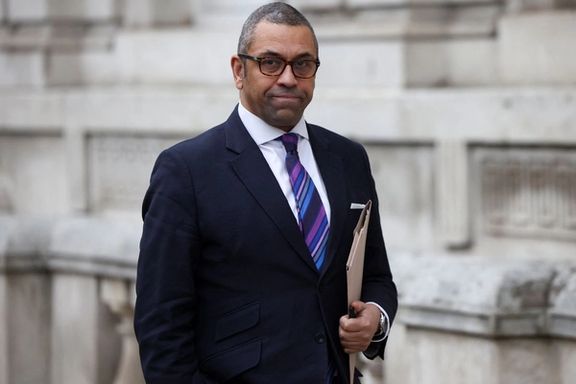
Plans for the United Kingdom to sanction’s Iran’s Revolutionary Guard have been pout on hold after the Foreign Office raised concerns, The Times reported on Thursday.

Plans for the United Kingdom to sanction’s Iran’s Revolutionary Guard have been pout on hold after the Foreign Office raised concerns, The Times reported on Thursday.
In the wake of a bloody crackdown on antigovernment protesters in Iran, Britain and the European Union began considering proscribing the Islamic Republic’s leading military, intelligence and internal security juggernaut.
The Revolutionary Guard (IRGC) has also been linked to acts of terror abroad, including threats against Iran International’s journalists working in London. The network’s headquarters in Chiswick came under Metropolitan Police protection in November when threats became serious.
The Times says that while home secretary Suella Braverman and security minister Tom Tugendhat support sanctioning the IRGC, according to sources the Foreign Office has blocked the move, “citing the need to keep communication channels open,” with Iran.
The report added that the Home Office is hopeful that “proscription will eventually progress but it is expected to be delayed by weeks if not months.”
The West’s relations with the Islamic have also soured for a lack of a nuclear agreement after almost two years of talks and Iran’s move to supply Russia with killer drones used against Ukraine.
In a separate ‘Leading Article’ The Times called for listing of the IRGC as a terror organization, saying not doing so would hardly change Tehran’s behavior and policies.
“Yet it is surely time to abandon the illusion that anything useful can be obtained though diplomatic engagement with Tehran. The theocratic regime has long since abandoned any restraint as it clings to power,” The Times said.
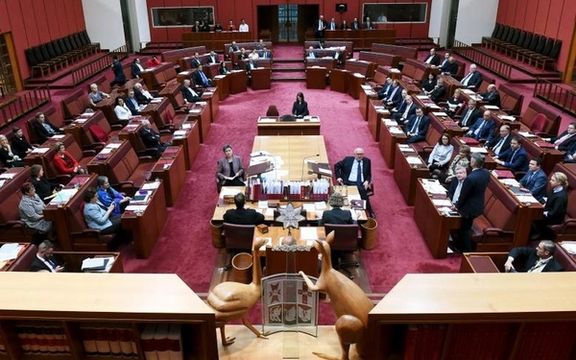
The Australian senate has called on the government to designate Iran’s Revolutionary Guard as a terrorist organization and impose further sanctions on the regime’s officials.
In a 128-page report on the current protests across Iran condemning institutionalized oppression of women and the Islamic Republic’s brutal response to quell the uprising, the senate decried the use of live ammunition and indiscriminate force by security agents against civilians.
The Foreign Affairs, Defense and Trade References Committee, which issued the report, urged the Australian Government to be unequivocal in its response to violence and human rights abuses in Iran, adding that “whilst Iran’s future must ultimately be written by the people of Iran in its own streets, the protection of human rights is a moral obligation and a practical necessity for us all.”
The committee, reporting on behalf of the senate, said that “evidence presented to the committee painfully illustrates the wholesale maltreatment of a nation by the very authorities whose job it is supposed to be to safeguard and protect the Iranian population.”
“Hundreds have been killed and many thousands wounded. Tens of thousands have been arrested. A number have been sentenced to death—some already executed—without access to a fair trial. Confessions are extracted through torture. Adults and children are subjected to horrific physical and sexual abuse in prison,” read part of the report, titled “Human rights implications of recent violence in Iran.”
Having studied a very large sample of submitted reports and evidence, the report made a series of recommendations designed to hold accountable a regime for abusing its own people, and reduce the Islamic Republic’s ability to violate human rights without consequence.
The committee recommended that the Australian Government take the necessary steps to formally categorize the IRGC as an organization involved in supporting and facilitating terrorism, also calling for the use of sanctions to target Islamic Republic and IRGC-affiliated individuals and entities responsible for malicious cyber activity against Australia.
It also urged the government “to use the available Magnitsky legislation to expand the list of individuals and entities subject to sanctions in response to human rights abuses in Iran, with particular focus on senior officials responsible for violence, human rights abuses, arbitrary detention and executions without due process.”
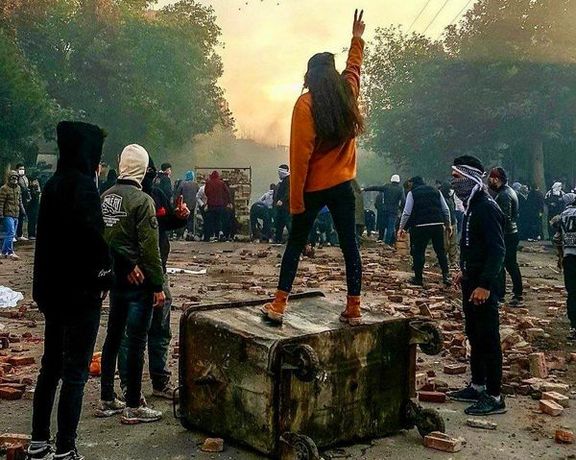
The document also called on Canberra to oppose the election of the Islamic Republic to United Nations’ bodies in light of the regime’s clear disregard for human rights, it said, particularly the rights of women and girls.
The senate also expressed concerns about credible allegations of intimidation and threats against Australian citizens, residents and their families, urging the responsible government ministers to provide an update to the Parliament and the Australian public on the government’s current assessment of whether persons connected to the regime are undertaking such behavior in Australia.
The committee also recommended that Australia should minimize relations with the Islamic Republic to “the greatest extent possible in recognition of the appalling behavior of the regime,” adding that the government should increase transparency and better inform the public about the status of its diplomatic relations with Tehran, as well as the security concerns in relation to the regime’s behavior relating to cybercrime, hostage diplomacy and threats to Australian residents.
“Implementing the committee’s recommendations would place Australia more firmly in the community of nations which have heard the Iranian people cry: Enough,” read the report, acknowledging that “Australia lagged well behind many of our partner Western democracies in taking action to send a clear unambivalent message to the Iranian regime that what they are doing is grossly unacceptable.”
The West has stepped up pressure on Iran over its crackdown on protests and arms supply for the Russian invasion of Ukraine as the US, European Union and United Kingdom imposed fresh sanctions on Tehran.
Earlier in the day, US Special Envoy for Iran Robert Malley said that “all corners of the Biden Administration have worked urgently and powerfully to mobilize the international community and confront the Iranian regime’s human rights abuses.”
On Tuesday, US lawmaker Representative Claudia Tenney (Rep-NY) reiterated, “We must impose the strictest sanctions possible on the leaders of the murderous Iranian regime, which is the world’s leading state sponsor of terrorism.”
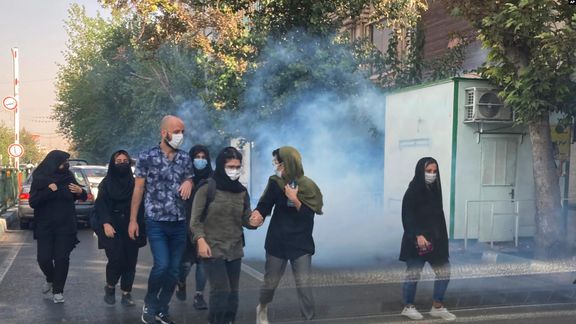
Australia has imposed new sanctions on Iranian security officials, following a series of sanctions by the United States and the European Union in recent weeks.
Australia on Tuesday sanctioned 16 individuals and one entity involved in the deadly suppression of antigovernment protests and supply of kamikaze drones to Russia used against Ukraine’s infrastructure.
The sanctions apply to travel bans and asset freezes on the targeted people for their role in “serious abused of human rights in Iran,” including the army’s commander-in-chief Abdolrahim Mousavi and key figures in the Basij militia of the Revolutionary Guard.
“The [Iran] listings cover serious violations or serious abuses of the right to life and the right not to be subjected to torture or to cruel, inhuman or degrading treatment or punishment,” the Australian government said Tuesday.
The United States also on Tuesday added seven Iranian entities to its trade blacklist for producing drones that Russia uses to attack Ukraine, the Department of Commerce said.
The United States and the European Union slapped a series of sanctions on Iranian officials and entities on January 23, citing human rights violations and the supply of drones to Russia.
The Australian parliament is scheduled to publish a report of its inquiry on the situation of human rights in Iran on Wednesday.
Iran has come under Western pressure since October for using widespread violence against protesters. So far, security forces have killed more than 500 citizens, seriously injured hundreds and arrested close to 19,000 people.

The United States Tuesday added seven Iranian entities to its trade blacklist for producing drones that Russia uses to attack Ukraine, the Department of Commerce said.
Nearing a year since Russia's invasion of Ukraine, allies have scrambled to gather and deploy air defenses to defeat cruise missiles and Iranian-built kamikaze drones that have attacked energy infrastructure this winter.
Tehran’s decision to supply drones to Moscow has led to Western backlash against the Islamic Republic amid suspended nuclear talks and the violent suppression of protests in Iran. Washington says Tehran should stop its military support for Russia and the crackdown on protesters.
After Ukraine brought down some Iranian drones and examined their remains, it was discovered in November that dozens of American and Canadian parts were used in their manufacturing.
Other ground-based air defense systems such as Raytheon Technology Corp's RTX.N Patriot have been pledged by the United Kingdom, the United States and the Netherlands as allies hope to stave off further power disruptions.
The Iranian entities added to the blacklist are Design and Manufacturing of Aircraft Engines, Islamic Revolutionary Guard Corps Aerospace Force, Islamic Revolutionary Guard Corps Research and Self-Sufficiency Jihad Organization, Oje Parvaz Mado Nafar Company, Paravar Pars Company, Qods Aviation Industry, and Shahed Aviation Industries.
The Commerce Department posting said the Iranian drones are being transferred to Russia for use in Ukraine, activity that is contrary to US national security and foreign policy interests.
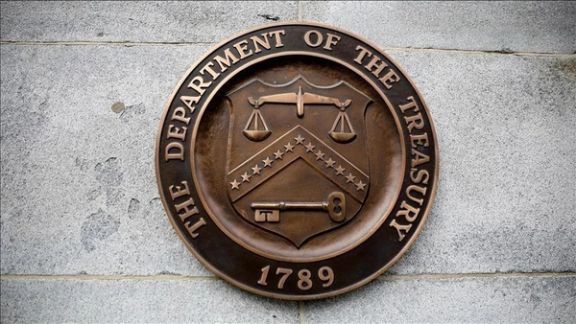
The United States is sending its top sanctions official to Turkey and the Middle East next week to warn countries and companies not to violate US sanctions on Russia and Iran.
Brian Nelson, undersecretary for terrorism and financial intelligence, will travel to Oman, the United Arab Emirates and Turkey from Jan. 29 to February 3 and meet with government officials as well as businesses and financial institutions to reiterate that Washington will continue to aggressively enforce its sanctions, a Treasury spokesperson told Reuters.
"Individuals and institutions operating in permissive jurisdictions risk potentially losing access to US markets on account of doing business with sanctioned entities or not conducting appropriate due diligence," the spokesperson said.
Although the trip appears to be firstly aimed at Turkey not to violate sanctions imposed on Russia, but Nelson will also raise the issue of Iran’s sanctions evasion.
Iran is using regional intermediaries to evade sanctions on its oil exports and financial transactions. The latest example is dollar smuggling from Iraq to Iran, which has prompted the US to scrutinize dollar transactions by Iraqi banks. The move has led to shortage of dollars in Iraq and fall of its currency.
Nelson will warn businesses and banks in Turkey that they should avoid transactions related to potential dual-use technology transfers, which could ultimately be used by Russia's military, the spokesperson said.
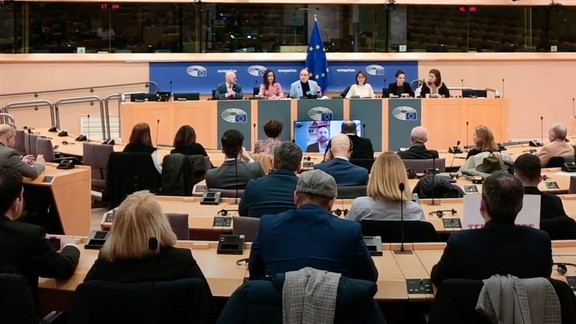
Members of the European Parliament held a meeting in the Belgian capital Brussels to discuss the designation of Iran’s Revolutionary Guard as a terrorist organization.
Swedish democrat Charlie Weimers, member of Belgian Parliament’s Committee on Foreign Affairs Darya Safai, and Dutch Minister of Justice and Security Dilan Yeşilgöz-Zegerius as well as many other activists such as RAND think tank analyst Alireza Nader and Stockholm-based rights defender Iraj Mesdaghi were among the participants.
The organizers and speakers of the meeting said they gathered together with the aim of providing more information to international and intergovernmental organizations and raise awareness about the reality of the IRGC. The session focused on two issues of the role of the Islamic Revolutionary Guard Corps in suppressing the antigovernment protests by the Iranian people and supplying arms for the Russian invasion of Ukraine.
According to the members of the parliament and political activists, the approval of the 32-point resolution adopted by the European Parliament on January 19, which called on the EU and member states to designate IRGC as a terrorist outfit, did not persuade the EU to take that step.
The European Parliament’s resolution also urged the EU to expand its sanctions list to cover all individuals and entities responsible for human rights violations and their family members, including Supreme Leader Ali Khamenei, President Ebrahim Raisi, Prosecutor General Mohammad Jafar Montazeri and all foundations (‘bonyads’) linked to the Islamic Revolutionary Guard Corps (IRCG).
During the Friday session, Weimers said, “The Islamic Revolutionary Guard Corps – or the IRGC -- stands up on behalf of the mullah's evil republic through tyranny murder and terrorism,” adding that “the IRGC is a force for political terror both at home and abroad.” It has trained, financed, armed and provided a safe haven for groups like Hezbollah, Hamas and Islamic Jihad, which have been listed as terrorists by many countries.
He also called on the EU to permanently suspend the talks to revive the 2015 nuclear deal, expressing regret that many members of parliament still hope that the agreement bears the fruits they seek.
The IRGC supported or motivated terrorist acts abroad, he said, noting that since the IRGC has provided support for assassinations, hijackings, bombings, kidnappings cyber-attacks, espionage, surveillance of Iranian dissidents, propaganda, delivery of explosives and arms all over Europe.
After the session, the Dutch justice minister twitted, “The Iranian Revolutionary Guards terrorize demonstrators fighting for freedom in Iran,” adding, “On behalf of the Netherlands, I again advocated adding the IRGC to the European terrorism list or imposing additional sanctions. We must continue to support the people of Iran.”
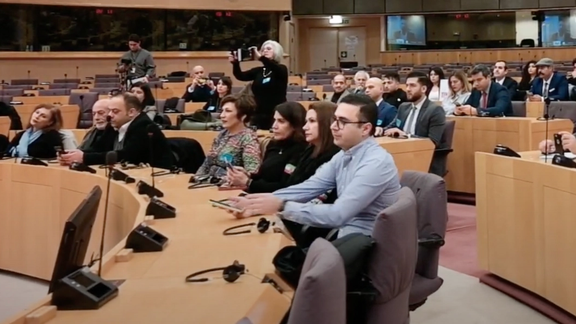
The issue of adding the Revolutionary Guard (IRGC) to the list of Europe’s terrorist entities became a rallying point for the Iranian diaspora, which launched online campaigns and held a large protest in Strasbourg on January 16 to lobby the European Parliament for passing the resolution.
The Iranian expatriates and members of the European Parliament also called for another gathering to push for the IRGC terrorist designation in Brussels on February 20.
The IRGC played a major role in suppressing antigovernment protests in the past four months, overseeing several security agencies that have killed over 500 civilians, jailed over 20,000 people and inflicted lasting injuries on hundreds of people.
Many officials of the European Union, including foreign policy chief Josep Borrell, are not in favor of sanctioning the IRGC, as they are concerned that the Islamic Republic will not be forthcoming in nuclear talks with the West. Negotiations that began in April 2021 to revive the 2015 Iran nuclear deal, known as the JCPOA, came to a deadlock last September. In the meantime, Tehran has supplied kamikaze drones to Russia, which are used in attacks on Ukraine’s civilian infrastructure.
The West has stepped up pressure on Iran over its crackdown on protests and arms supply for the Russian invasion of Ukraine as the US, the European Union and United Kingdom imposed fresh sanctions on Tehran. In a retaliatory move, the Islamic Republic also designated over 30 European and British individuals and entities.
Also on Friday, European Parliament President Roberta Metsola condemned the decision of the Iranian regime to sanction several MEPs, as well as journalists, human rights defenders and institutions, underlining that “Women have the right to protest. Women's lives and women’s liberties are inviolable. The European Parliament will not stop fighting for these fundamental values. We will not stop standing up for freedom, dignity and equality. We will not be silenced.”